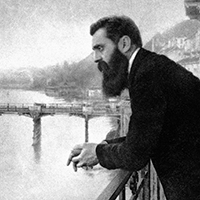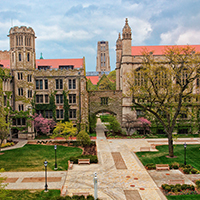JPC Curriculum and Schedule
The JPC curriculum is organized around a few central themes that address different manifestations of religion and nationalism in various political spheres. Students will have a unique and intimate opportunity to discuss and debate the divisive policy questions facing the Jewish people.
 The “Jewish State” and Contemporary Nationalism
The “Jewish State” and Contemporary Nationalism
Since the founding of the Zionist movement, Jews have debated what it means to build a Jewish state. Is Zionism a political movement? A cultural program? A religious awakening? Are the ideas of Herzl, Rav Kook, Jabotinsky, and Ahad Ha’am still relevant today, or must Zionism renew itself with a new approach in the twenty-first century? These questions continue to reverberate as Israel affirms itself as a Jewish and democratic nation-state in a world polarized by questions of ethnic and religious nationalism. We will explore what the persistent allure of the “Jewish state” tells us about the meaning and necessity of communal identity and patriotism. Leading activists will debate the wisdom of the “Jewish Nation-State Law,” the merits of Israel’s conversion policies, and the meaning of the resurgence of Jewish themes in Israeli cultural life. We’ll also probe how varying ideological perspectives on nationalism impact the perspectives taken on Israel throughout the world while posing new challenges for Israeli foreign policy.
 Challenges and Opportunities in a “Jewish and Democratic” State
Challenges and Opportunities in a “Jewish and Democratic” State
How do religious and democratic values coexist in Israel’s public sphere? Can the growing Haredi sector become integrated into broader Israeli society? What should be done to heal the relationship between Israel and American Jewry? Should halakha have in role shaping Israeli law relating to the military, citizenship, and family life? How should Shabbat be celebrated within the public sphere of a diverse country? What roles does the judiciary play in answering these questions? These are just a sample of the many dilemmas facing Israeli society as it builds a vibrant Jewish and democratic state within an explosive region and unstable world order. Leading Israeli activists, journalists, and thinkers will guide us in exploring these quandaries and offering their proposals to help move Israel forward.
 Religion in Western Political Culture
Religion in Western Political Culture
Many liberal democracies seek to preserve freedom of conscience by regulating the role of religion in the public square. Does such regulation infringe upon the religious liberty of its faithful citizens? Given the plurality of ethical positions today, some believe that we can no longer confidently make moral judgments. How can we preserve a meaningful liberal education and continue to assert ethical truths within this climate? Can societies committed to individual choice preserve central social structures like families and formative traditions? These questions will be explored with a particular eye for the implications on traditional Jewish values and whether Jews might create interfaith political alliances to address these challenges.
Schedule and Format
Regular sessions will begin on Friday, October 30, 2020, and take place twelve times over the course of the year. Each session will meet in central Jerusalem on Friday mornings between 9:00 a.m.–1:00 p.m. A delicious brunch will be served at each meeting. When necessary, transportation for students is provided to and/or from the events. Fellows participate in two additional shabbaton retreats at hotels around the country.
The presentations feature dynamic lectures followed by Q & A as well as occasional debates. During select weeks, the group will break into small reading groups to explore classic works of Zionist thought and their continued meaning in the 21st century.
Before every session, participants will be expected to carefully prepare the assigned readings that provide critical background information for each presentation. Students must commit to regular attendance and to actively engage in group discussions.
The program is fully sponsored by the Tikvah Fund and is free of charge.
Who Should Apply?
-
Gap-year participants looking to get more out of their time living in Israel.
-
High school graduates looking to develop into informed and passionate leaders on the college campus.
-
Yeshiva and seminary students who want to explore how Jewish wisdom can contribute to the challenges facing modern society.

